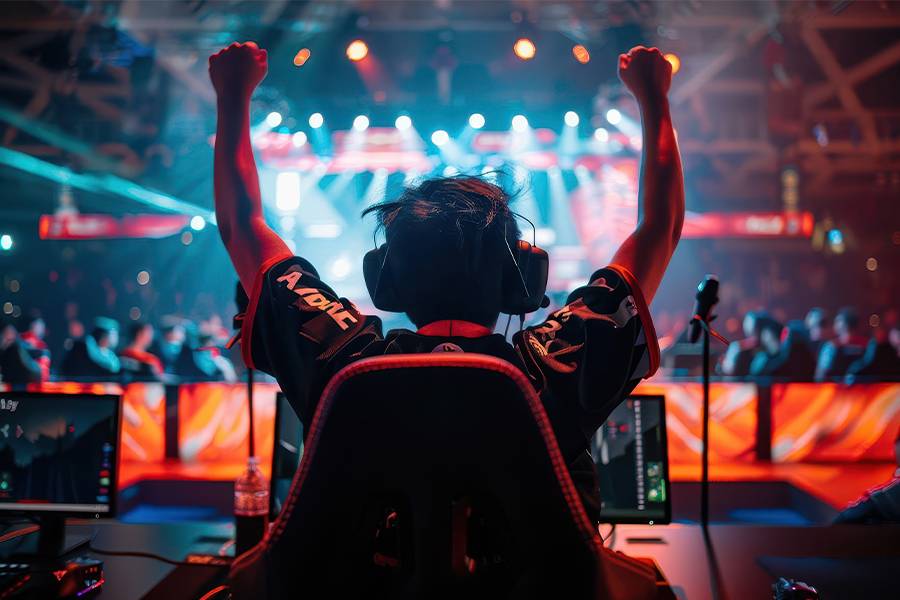Game on! how are regulators keeping up with the action in mainland China, japan, the philippines and taiwan?
Regulations governing e-sports events in mainland China
E-sports events are at the heart of the electronic sports industry, bringing together game publishers/operators, event operators, live streaming platforms, clubs and e-sports players.
Approvals and permits
E-sports event participants are required to obtain the following qualifications and licences to engage in industry-related activities in mainland China:
 Wei Quan
Wei Quan
Partner
Jingtian & Gongcheng
Beijing
Tel: 86 10 5809 1166
Email: quan.wei@jingtian.com
Game publishers/operators: games eligible for e-sports events shall be those that can be legally published and operated in mainland China with a game publication number (ISBN) and an approval number. Game publishers are required to obtain an Online Publishing Service Licence, and game operators are required to obtain a Value-added Telecommunications Business Licence, among others.
E-sports event operators: international e-sports events hosted or co-organised by the Sports Information Centre of the General Administration of Sport of China (CSIC) are regulated using a class-based approach, and a filing should be submitted to the CSIC in advance. In the case of events (international or national) hosted by entities other than the CSIC, the obligations to submit filings or obtain approval vary across different regions. Shanghai requires all e-sports events to be approved like sports events; Chengdu and Xi’an only require filings to be submitted according to the specific regulations of the hosting district; while other places like Beijing, Hangzhou, Suzhou and Wuhan do not require special approval from, or filings to, the sports authorities. However, considering that offline e-sports events are performances, the operator of the e-sports event needs to obtain a Commercial Performance Permit, and to organise a specific offline event, there are obligations to obtain permits from or submit filings to the departments of culture, health, fire protection, public security, etc., in accordance with the requirements imposed on commercial performances/large-scale activities.
E-sports live streaming platforms: e-sports live streaming platforms need to obtain relevant licences to engage in live streaming business, including the Value-added Telecommunications Business Licence, Network Culture Business Licence, Licence for Dissemination of Audio-Visual Programmes through Information Network, etc.
E-sports clubs and e-sports players: e-sports clubs and e-sports players may register with the regulator on a voluntary basis, but unregistered e-sports clubs and players are not allowed to participate in international, national and regional e-sports events approved by the CSIC, the All-China Sports Federation, and sports authorities at all levels across the country. To register, an e-sports club shall have at least five registered players, with the registration submitted to the local sports authority. E-sports players need to register with the provincial sports authorities in their places of residence or place of hukou registration, and e-sports players must be at least 18 years old to be eligible for e-sports events. Local e-sports associations might impose special eligibility criteria on clubs and players for registration.
Industry practices
In addition to the necessary licences/qualifications required for the distribution/operation of games and the holding of e-sports events, the content, publicity and promotion of games and events should comply with laws and regulations, and the operators of games and events should focus on provisions and requirements related to the collection and use of personal information and the protection of minors, conduct necessary content review and classification in accordance with relevant laws and regulations, establish management systems and protection mechanisms, and take necessary technical measures.
Second, clubs and members of clubs participating in e-sports events (including but not limited to coaches, managers, owners, starting players, substitute players, trainees, etc.) shall abide by the rules issued by the event organisers.
The rules vary from event to event, but generally include league schedules and a prize pool, team member eligibility, official roster changes (rules regarding player substitutions, including transfers or loans between teams, signing or releasing players, and promoting, demoting or loaning players), requirements on players’ equipment, league format, game process, online competition rules, code of conduct for players and clubs (including restrictions on players’ competitive behaviour, unprofessional/improper behaviour and club business behaviour, and no violation of financial fairness regulations), punishment, etc.
Third, since the majority of the income of the e-sports industry in mainland China is from live streaming, e-sports practitioners engaged in live streaming should also strictly abide by various laws, regulations and code of conduct related to live streaming.
These laws and regulations include, among others: the national and local laws and regulations; the code of conduct issued by the event organisers; the Code of Conduct for E-sports Streamers jointly issued by the e-sports industry association and other norms issued by e-sports industry associations; the rules and management norms issued by the e-sports live streaming platforms; the articles of association and processes of the e-sports clubs; and the contracts signed with the e-sports clubs, etc.
For example, they are not allowed to publish harmful content prohibited by laws and regulations, or bloody, shocking, cruel and other content that may cause physical and/or mental discomfort, encourage minors to imitate unsafe behaviour, violate social morality, or induce minors to develop unhealthy habits.
E-sports clubs are also not allowed to make speeches that infringe on the reputation, privacy, intellectual property rights, or other lawful rights and interests of others.
Intellectual property rights
The ownership and use of any form of intellectual property rights involved in games and e-sports events (including but not limited to game software, written works, audiovisual works, artworks, musical works, etc.) can be agreed on through contracts.
Therefore, it is important to sign a complete and clear written contract for the ownership and use of relevant accounts and intellectual property rights, especially between e-sports clubs and e-sports players where disputes arise frequently in practice.
As to the accounts, according to current industry practice, the organiser of the e-sports event will provide players with a special account for the competition, with the player’s personal game account registered and used by the player, and the club not usually involved in the use of that account.
For social media accounts, the platform that provides the account and services usually stipulates that the ownership of the account belongs to the platform, and the user registering the account obtains the right to use the account and related property rights.
As public figures, the social media accounts of e-sports players also have high commercial value, and for the purpose of marketing promotion and maximisation of commercial value, such social media accounts may be jointly operated by clubs and players.
Therefore, the contract between e-sports clubs and e-sports players needs to clearly stipulate the account use rights, the entitlement to the proceeds, the operation and management authority of the account, the disposal of the account and the contents posted in the account when the player leaves the club.
During the event, a series of text works, photography/artworks, audio and video recordings, audiovisual works and other content related to the clubs and the players will be generated, and the player’s name (including real name and professional ID, social media account ID), portrait, voice, as well as the club’s name, trademark, brand, logo, etc., will be used.
The intellectual property rights of the content created by the club and published on the club’s official account are usually owned by the club, but the ownership of the intellectual property rights of the content created by the club and the player together and published on the player’s personal account may become a subject of dispute if it is not expressly defined in the contract.
Therefore, the contract shall clarify the ownership of the intellectual property rights of the content generated during the performance of the contract, the respective rights to use and restrictions for both the club and the player, the licensing of each other’s rights, and whether the content already published in the accounts can be retained, and how this content can be used after the player leaves the club.
E-sports, which combine the attributes of competitive sports and entertainment, have grown into a sport and cultural phenomenon. As the industry develops, the co-operation of various participants will become more diversified and complex, which will inevitably lead to more complex legal issues and disputes.
The author will closely follow the development of laws and regulations, industry policies, market development and business practices of the e-sports industry to provide legal support to protect the legitimate rights and interests of all parties involved in the e-sports industry.
 Jingtian & Gongcheng
Jingtian & Gongcheng
34th Floor, Tower 3,
China Central Place,
77 Jianguo Road,
Chaoyang District,
Beijing, China
Contact details:
Tel: (86-10) 5809-1000
Fax: (86-10) 5809-1100
Email: jingtianbj@jingtian.com
www.jingtian.com
The cutting edge of gaming and e-sports in Japan
E-sports events are at the heart of the electronic sports industry, bringing together game publishers/operators, event operators, live streaming platforms, clubs and e-sports players.
With minimal regulation, Japan is at the forefront of the gaming and e-sports industry.
Neither game software manufacturing nor creating individual games requires government approval or permits.
 Sayaka Kano
Sayaka Kano
Partner
Anderson Mori & Tomotsune
Tokyo
Tel: 81-3-6775-1264
Email: sayaka.kano@amt-law.com
There are also no specific legal restrictions on selling games to minors. However, due to the potential impact of game content on minors, many game software manufacturers have voluntarily joined self-regulatory organisations such as the Ethics Organisation of Computer Software (EOCS) or the Computer Entertainment Rating Organisation (CERO).
These organisations have developed an age rating system that categorises games by appropriate age groups and, following their review, the rating is displayed on game packaging.
Since Japanese distributors (including game platforms and hardware providers) typically require this labelling, in many cases it is practically necessary to undergo these reviews.
Staging tournaments
Staging e-sports or gaming tournaments is primarily regulated under the Amusement Businesses Law, the Unjustifiable Premiums and Misleading Representations Act, and gambling regulation under the Penal Code. Notably, the latter two laws raise concerns about the legality of tournaments offering large cash prizes.
To ensure legal compliance, prizemoney must be carefully structured considering participant attributes – such as whether they hold a professional licence certified by the Japan e-sports Union (JeSU) – as well as the structure of participation fees.
Some tournaments also adjust prize amounts based on the winner’s attributes, including whether they possess professional licences, or are minors. Moreover, the limited number of game titles covered by JeSU licences remains a challenge.
Play to earn
In recent years, blockchain games that employ a “play to earn” mechanism have attracted a lot of attention in the gaming industry.
Play to earn means that game items and characters are issued as tokens on the blockchain, and players can earn tokens redeemable with fiat currencies by playing the game – literally “playing” the game to “earn” money.
Since players earn tokens that can be converted into fiat currency through game play, it is sometimes called “GameFi”, as a new type of game that combines elements of game and finance.
In blockchain games, when in-game currency or in-game items are issued as tokens on the blockchain, they are not managed on the game operator’s internal servers, but rather by the users themselves, who manage their own private keys to “hold” these in-game currency or in-game items on the blockchain.
In addition, users can trade in-game items and other items through the blockchain without being restricted by the game operator.
Legal issues
Since blockchain games have not only a game element but also a finance element, a number of legal issues need to be considered.
 Takeshi Nagase
Takeshi Nagase
Partner
Anderson Mori & Tomotsune
Tokyo
Tel: 81-3-6775-1200
Email: takeshi.nagase@amt-law.com
Payment Services Act (PSA). The issue is whether non-fungible tokens (NFTs) – which represent game items and characters issued and traded in blockchain games – are subject to financial regulation as crypto assets under the PSA, similar to Bitcoin and Ether.
Since NFTs are generally individualistic and irreplaceable tokens, they are not usually considered to be crypto assets because they are not recognised as a means of payment, like Bitcoin.
However, in a blockchain game, it is common to assume that multiple NFTs may be issued for the same character.
Therefore, compared to NFTs representing one-of-a-kind digital art, NFTs representing game items/game characters (Game NFTs) in blockchain games are relatively less unique, and it is necessary to consider whether they could be recognised as a means of payment and be subject to regulation as crypto assets under the PSA.
Gambling under Penal Code. Blockchain games often introduce specifications in which users pay a certain amount of money/crypto assets to obtain Game NFTs that vary in rarity at random, through gachas or random pack sales.
Since Game NFTs acquired through gachas, etc., can be bought and sold on trading platforms, and each Game NFT can have a different value, this raises the question of whether the game operators and players are making so-called “bets”, which may be considered gambling under the Penal Code.
Under the Penal Code, gambling is defined as “an act in which two or more persons compete to gain or lose property or property benefits by winning or losing by chance”, so a detailed examination is required to determine whether it can be considered “competing to gain or lose”.
Unjustifiable Premiums and Misleading Representations Act (UPMRA). It is also important to note conflict with the UPMRA, which restricts businesses from offering excessive premiums in the services they provide. In order to prevent unhealthy competition caused by excessive premiums, the UPMRA limits the maximum amount and total amount of premiums that can be offered, depending on the method of offering them.
In blockchain games, as in traditional online games, tokens could be offered as rewards for certain game play and achievements. If the rewards fall under the category of premiums under the UPMRA, it is necessary to comply with regulations regarding the maximum amount and the total amount.
Therefore, it is necessary to be careful when determining the applicability of the remuneration and setting the amount.
Financial Instruments and Exchange Act (FIEA). In blockchain games, a mechanism called “scholarship” may be established, in which one player purchases Game NFTs and lends them to other players to play games, earning tokens and receiving a portion of the tokens earned.
In this regard, under the FIEA, a scheme – where the investment of others funds the business in which the investment is made with proceeds returned to the investors – falls under the category of collective investment scheme interests (CISIs).
In principle, CISIs cannot be made without registration as a financial instruments business operator under the FIEA (so-called Fund Regulations). Since the scholarship is a loan of purchased Game NFTs to others to earn tokens and acquire a portion of the tokens, it can be questioned whether this scholarship mechanism violates the Fund Regulations.
Generative AI
In the field of Generative AI, it is assumed that the first step in the development of machine learning is to collect data containing copyrighted works, process it as a dataset for training, input it into a training program, and use it to develop and train a generative AI model.
 Takashi Nakazaki
Takashi Nakazaki
Special Counsel
Anderson Mori & Tomotsune
Tokyo
Tel: 81-3-6775-1086 Email: takashi.nakazaki@amt-law.com
In terms of collection, there may be cases where information scattered on the internet containing copyright material is collected by scraping, or where a dataset is provided by a third party containing copyrighted material.
The act of processing a dataset for learning falls under the category of reproduction and adaptation, which typically only copyright holders were permitted to do. By contrast, AI developers were originally not allowed to do this.
However, flexible rights limitation provisions have since made it possible for AI developers to process datasets for learning, which is why the Copyright Act of Japan is often referred to as a machine learning paradise.
In fact, generative AI is increasingly being used in the Japanese gaming industry. For example, Level-Five, a game software manufacturer of the well-known Yokai Watch, which has sold more than 17 million units worldwide, has publicly announced that ite is using generative AI in the production of its games going forward.
On the other hand, many in the Japanese game, manga and animation fan communities have responded with hostility to the use of generative AI in content creation, and many content creators have expressed concerns that their content may be imitated by generative AI.
As a result, the Japanese gaming industry finds itself in a dilemma. It wants to use generative AI for content creation – and has cleared the associated legal risks – but is wary of taking the plunge into full-scale use due to concerns about reputational risks, such as fan backlash.
 Anderson Mori & Tomotsune
Anderson Mori & Tomotsune
Otemachi Park Building
1-1-1 Otemachi, Chiyoda-ku
Tokyo 100 8136, Japan
Contact details:
Tel: +81 3 6775 1000
Email: info@amt-law.com
www.amt-law.com
Game on: Navigating e-sports regulations in the Philippines
Electronic sports (e-sports) in the Philippines has seen rapid growth in the past decade, primarily driven by technological advancements, better internet infrastructure, and the younger population’s enthusiasm for competitive gaming.
 Mark S Gorriceta
Mark S Gorriceta
Managing Partner
Gorriceta Africa Cauton & Saavedra
Metro Manila
Tel: +63 2 8696 0687/0988
Email: msgorriceta@gorricetalaw.com
The pandemic further accelerated this phenomenon as people turned to virtual platforms for entertainment and social engagement when traditional sports and events were paused.
Ever since, e-sports has evolved not only as a hobby or source of entertainment, but also professional sport, with a source of income for players and organisers. In 2019, e-sports became an official medal event during the Southeast Asian Games, marking a significant step in its recognition on the international stage within a multi-sport competition.
The Philippines is considered a “mobile first” nation in e-sports, as more players access available games via mobile phones compared to desktop computers. This trend is attributed to the accessibility and lower barriers to entry associated with mobile gaming.
The country actively embraces and encourages the industry’s growth and has fostered a generally supportive environment for players, organisers
and investors alike. Notably, there are limited regulations governing e-sports in the Philippines.
As the industry continues to grow, here is a summary of the regulatory landscape and legal requirements relevant to the sector, particularly regarding licensing and compliance.
Defining electronic gaming
Electronic gaming in the Philippines can refer to two things: (1) electronic gaming as defined by the Philippine Amusement and Gaming Corporation (PAGCOR); or (2) electronic gaming relating to e-sports.
The PAGCOR defines electronic gaming as games of chance accessible through an electronic gaming platform, offered in onsite operations of various PAGCOR-licensed gaming venues along with the online operation of their respective online gaming platforms. This includes sports betting, specialty games, electronic bingo games, electronic casino games, and online poker games.
In addition to the PAGCOR, authorities in special economic zones in the country play a role in regulating electronic gaming within their jurisdictions. Each of these bodies is empowered to oversee gaming activities within their areas, providing a distinct framework that exists outside of the PAGCOR’s regulatory authority.
Meanwhile, electronic gaming can also mean activities known as e-sports, which include “all professional electronic sports or competitive video games, including real-time strategy, fighting, first-person shooter (FPS), multiplayer online battle arena (MOBA), arcade games and other genres, where players or teams compete using computers or other electronic gadgets connected to the internet, local area network or other electronic systems for prize money and/or other compensation”.
Regulatory landscape
The Games and Amusements Board (GAB) is responsible for implementing and enforcing rules and regulations governing the conduct of all professional sports and games in the Philippines.
 Micaela Kristina V Galvez
Micaela Kristina V Galvez
Partner
Gorriceta Africa Cauton & Saavedra
Metro Manila
Tel: +632 8696 0687
Email: counselors@gorricetalaw.com
In 2017, the GAB recognised e-sports as one of the professional activities falling under its regulation and supervision. The GAB acknowledged the need to supervise and regulate e-sports activities to protect the health and welfare of gamers, and enforce the responsibilities of organisers, the public and the government.
Similar to traditional sports, e-sports activities are vulnerable to game-fixing, fraud and potential breach of contracts, which the GAB aims to prevent.
The GAB issued Resolution No. 2017-21, series of 2017, on the Guidelines Governing the Conduct of Electronic Sports in the Philippines. This was subsequently amended by GAB Resolution No. 2018-15, series of 2018, on the Amended Rules and Regulations Governing Professional Electronic Sports in the Philippines (e-sports rules).
The e-sports rules apply to all professional electronic sports, including tournaments or competitions conducted for profit by promoters, operators, owners, leagues, foundations or athletic societies. A tournament or competition is presumed to be conducted for profit if it has gate entry fees, television coverage, paid advertisements or sponsors.
However, the following events are excluded from coverage of the e-sports rules:
Those held by or under the auspices of national sports associations, duly recognised by the Philippine Olympic Committee, solely for the development of the national training pool;
Those held by schools, colleges and universities for the health and sports development of their students, or by athletic associations and organisations of schools, colleges and universities participated in solely by bona fide students of the member schools, colleges and universities; and
Those that are “open to all”, or can be participated in by enthusiasts and/or the general public, including qualifiers or elimination rounds/phases.
As mentioned, the GAB supervises professional e-sports in the Philippines, including appointing officials or personnel for professional e-sports events. The GAB also has the power to order the suspension of any tournament or competition in cases of violation or non-compliance with the e-sports rules and any other applicable laws, rules or regulations promulgated relative to professional e-sports.
Licences, permits and obligations
The e-sports rules require all persons, entities or associations connected with, engaged in, or participating in the conduct or operation of professional e-sports to obtain the appropriate licence from the GAB before they may engage in professional e-sports activities in the Philippines.
 Kathleen T Guiang
Kathleen T Guiang
Associate
Gorriceta Africa Cauton & Saavedra
Metro Manila
Tel: +632 8696 0687
Email: counselors@gorricetalaw.com
The rules also provide for licences for different types of personnel involved in e-sports including promoters/organisers, team managers, team trainers/coaches, security officers/marshalls, medical officers, liaison officers, analysts and casters. Each of these individuals must pay the corresponding licence fees and submit the documentary requirements to the GAB.
GAB-issued licences are generally valid for one year. Additionally, the guidelines mandate that no tournament, competition or professional e-sports game may take place without a permit issued by the GAB. The promoter of the event is responsible for securing this permit, which requires an application with the GAB at least 10 days prior to the start of the event.
Notably, the e-sports rules identified the following responsibilities of promoters: (1) to ensure peace and order are maintained and that the rules and regulations are properly observed; (2) to prevent and stop any act of cheating, game-fixing or inappropriate influence on the conduct, progress or result of the tournament or competition; (3) to report any findings of actions that may compromise the integrity of the game; and (4) to ensure that all contracts or agreements are faithfully observed and fulfilled.
Strengthening the industry
As of now, the e-sports rules remain the only regulation governing the e-sports industry in the Philippines. While this provides a structured framework for licensing relevant individuals and personnel involved in professional e-sports events, the rules do not address other relevant topics such as player rights and tournament oversight.
As the industry continues to grow rapidly, the existing regulatory framework may show its limitations. For many years, some legislators have sought to pass legislation that will create a dedicated government body to oversee the e-sports industry.
In the current 19th Congress, several bills are pending, including Senate Bill No. 2121 and House Bill No. 5401, aiming to establish and organise a Philippine Electronic Sports Commission, and House Bill No. 7411, which seek to provide a charter for e-sports gamers.
However, up until now, there are no substantial developments regarding the status of pending legislation.
Nonetheless, policymakers have expressed their support for stronger regulations for all kinds of electronic gaming, including e-sports, to prevent the proliferation of money laundering, human trafficking and other crimes, as seen in the case of Philippine Offshore Gaming Operators under the PAGCOR’s regulatory authority.
More stringent and comprehensive regulations should be implemented to guide the e-sports industry’s evolution and to ensure the protection of all players, organisers and other personnel involved in its growth.
 GORRICETA AFRICA CAUTON & SAAVEDRA
GORRICETA AFRICA CAUTON & SAAVEDRA
15/F Strata 2000, F. Ortigas Jr. Road
Ortigas Center, Pasig City
Metro Manila – 1605
Philippines
Contact details:
Tel: +632 8696 0687
Email: counselors@gorricetalaw.com
www.gorricetalaw.com
Game development and distribution in Taiwan
The game industry is more than just entertainment; it involves complex legal matters. Game developers and companies must be aware of these issues and take proactive steps to protect their creations and ensure compliance with the law. The following is an introduction to key legal issues in game development and distribution in Taiwan.
Developing games
One of the primary legal concerns in the game industry is intellectual property protection. Game developers invest significant amounts of time and resources into creating original content, making it crucial to safeguard their intellectual property rights.
 Tsung-Yuan Shen
Tsung-Yuan Shen
Associate Partner
Lee and Li
Taipei
Tel: +886 2 2763 8000 (ext. 2539)
Email: tsungyuanshen@leeandli.com
Safeguarding includes obtaining copyright for game software, characters, storylines and other creative elements. Additionally, developers should consider trademark protection for their game titles and logos to prevent unauthorised use by others.
According to Taiwanese copyright law, the creator of a work holds its copyright on its completion. The ownership of the copyright can be determined through agreements. In cases where there are no agreements:
The copyright of a work created by an employee during his or her employment belongs to the employer; and
The copyright of a work commissioned to a contractor belongs to the contractor.
Disputes between game developers have arisen over copyright ownership of games developed by a team. The question of whether members of a team are considered employees or contractors has led to concerns about potential infringement of the original employer’s copyright. Therefore, it is crucial for game developers to clearly outline the relationship and the ownership of intellectual property in contracts with their employees and contractors to avoid any potential disputes.
Court perspective
When developing games, it is important to avoid infringing on the intellectual property rights of others, especially copyright. Many games on the market have similar game rules or background settings, but does this constitute copyright infringement?
To address this issue, it is necessary to first examine the scope of copyright protection under Taiwan’s copyright law. Protected works under Taiwan’s copyright law refer to intellectual creations of authors which, in addition to expressing thoughts or emotions and having a certain form of expression, must also be original. Slogans, common symbols, names, formulas, numerical tables, charts, books or calendars cannot be the subject of copyright.
Taiwan’s courts have provided some valuable insights into copyright infringement cases related to games. For example, in a case involving a specific type of matrix diagram explaining game rules, a game developer argued that the design of the matrix diagram, including the connection effects and the number of patterns, allowed players to easily and quickly understand the gameplay; it therefore demonstrated a certain level of creativity.
However, a court held that the matrix diagram was simply a combination of common numbers, tables and colours, and found that an explanation of game rules should be considered an expression of the game rules. Using charts and diagrams to explain game rules is a common practice in the industry, so a matrix diagram is merely a common table and not a work protected by copyright law.
Plagiarism
Plagiarism of others’ works is a common form of copyright infringement. Taiwanese courts have identified two elements for determining plagiarism: contact and substantial similarity, with substantial similarity referring to both quantitative and qualitative similarity. The degree of evidence and standard of determination of the two elements will affect each other.
 Rachel Chen
Rachel Chen
Senior Attorney
Lee and Li
Hsinchu
Tel: +886 3 579 9911 (ext. 3206)
Email: rachelchen@leeandli.com
For example, if the degree of similarity is not high, a copyright owner should bear a higher burden of proof regarding the “possibility of contact”. However, if the degree of similarity is very high, then it is only necessary to prove there is a reasonable opportunity or possibility of contact.
In one litigation case, two games had the theme of a Greek sea god. They both used Greek temples and the sea as backgrounds, with the game interface featuring mermaids or golden Greek palaces as bonus symbols. However, a court compared the design details, graphic interfaces and presentation methods of the two games, and concluded that the theme of the Greek sea god was an expression of a concept that was not protected by copyright.
Therefore, others could not be restricted from using the same sea god concept for creation, as long as both games were independently created. The mere order of creation cannot be used to determine that the latter infringes the copyright of the former.
Distributing games
Prior to being listed on the market, a game must be registered on the government’s official website, and prominent classification information must be displayed on the product packaging, game downloads, initial web pages or links. This information includes the game level, plot and warnings. Games from mainland China must be distributed by Taiwanese companies and must be approved by the regulatory authority in advance.
According to the Game Software Classification Management Regulations, games are classified by content into the following categories:
Restricted (for use by individuals aged 18 and above);
Guidance 15 (for use by individuals aged 15 and above);
Guidance 12 (for use by individuals aged 12 and above);
Protection (for use by individuals aged 6 and above); and
General (for use by individuals of all ages).
Games involving virtual currency fall under the “Guidance 15” category and above.
In Taiwan, there are relatively few independent game developers. A common formula is to act as agents or distributors for foreign games. Distributors are deemed to be operators of game businesses, and are subject to the same requirements and responsibilities as the game issuer under the Taiwan Consumer Protection Act. The responsibility for displaying classification information also lies with the game issuer or distributor.
Player contracts
When issuing games, it is crucial to also consider contracts with players (consumers). Generally, contracts between game issuers and players are formulated by the game issuer, and are subject to the regulations of standardised contracts. The terms of standardised contracts should adhere to the principles of equality and mutual benefit, and players should be given a reasonable period to review the entire contract content. Any terms that violate the principle of good faith or appear unfair to players are deemed invalid.
For games involving online game points (cards) and online game services, regulatory authorities have issued additional regulations that specify required and prohibited items in these standardised game contracts. For example, game issuers are required to specify payment methods and product information, as well as the probability and information of winning prizes for all or part of the paid goods or activities. Purchased points cannot include an expiration date.
Advertising
The advertisement of games often comes with activities such as lottery or treasure chest draws but, if the advertising of winning probabilities is found to be false or misleading, it could lead to issues of unfair advertisement. Unfair advertisement is strictly prohibited under article 21 of the Fair Trade Act.
Typically, such cases are brought to the attention of regulatory authorities by players’ reporting. A common scenario involves discrepancies between the winning probabilities announced by game companies and the actual probabilities set within games, with the latter being lower than the former.
The competent authority is the Fair Trade Commission. It holds the view that this regulation governs matters that have a soliciting effect on goods or services, including those that have an economic value and are not directly part of a transaction, but are sufficient to influence transaction decisions.
These include, for example, the provision of gifts, prizes, and the probabilities or awards of winning items or services. Therefore, when game companies advertise prizes or probabilities in their advertisements or on their websites, they are providing crucial information that influences players’ transaction decisions.
An unfair advertisement may result in a fine from TWD50,000 (USD1,700) to TWD25 million. Further penalties may be imposed for subsequent violations.
Conclusion
The game industry presents complex legal landscapes. Game developers and companies must be proactive in addressing legal issues such as intellectual property protection and regulatory compliance, to ensure the success and sustainability of their businesses in this rapidly evolving industry.
 LEE AND LI, ATTORNEYS-AT-LAW
LEE AND LI, ATTORNEYS-AT-LAW
8F, No.555, Sec. 4, Zhongxiao E. Rd.,
Taipei 11072, Taiwan, R.O.C.
Tel: +886-2-2763-80005F, Science Park Life Hub, No. 1, Industry E 2nd Rd,
Hsinchu Science Park, Hsinchu 30075, Taiwan, ROC.
Tel: +886 3 579 9911
Email: attorneys@leeandli.com
https://www.leeandli.com/EN
